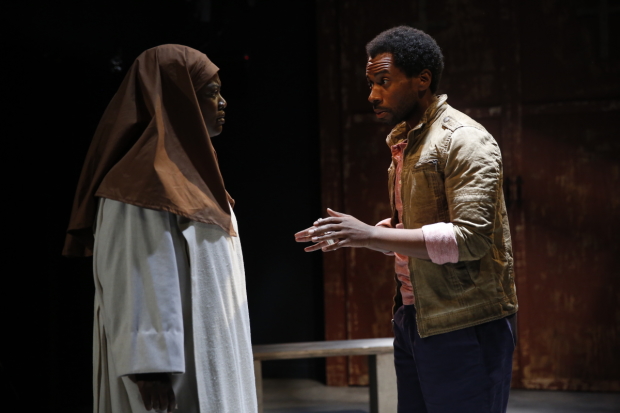Sense of an Ending
Catholic nuns stand accused of facilitating genocide in Ken Urban’s new drama.

(© Carol Rosegg)
Even in the cozy confines of Theater C at 59E59 Theaters, one immediately feels the enormity of the devastation at the heart of Ken Urban's Sense of an Ending, now making its U.S. premiere with kef theatrical productions. A heavy curtain of laundry hangs above the perimeter of the playing space in David L. Arsenault's efficient and disquieting set. It feels unlikely that the original owners of this clothing will ever return to claim it. The giant red door of a Catholic church, paint peeling off, sits upstage in silent witness. It's an apt encapsulation of the entire play, a thoughtful meditation on guilt that is frustratingly sabotaged by an unnecessary B-plot.
Set just five short years after the 1994 Rwandan genocide, Sense of an Ending is inspired by the case of the Nuns of Sovu, in which a Belgian court convicted two Rwandan nuns of war crimes for aiding Hutu militiamen in the murder of thousands of Tutsi refugees who had sought sanctuary in their monastery. The most damning charge, repeated in this play, is that the sisters supplied the militias with gasoline so they could burn their victims alive.
Urban filters this gruesome tale through Charles (Joshua David Robinson), a journalist who seems to be based on disgraced New York Times reporter Jayson Blair. His career is in a slump after a plagiarism scandal, but he's hell-bent on using this story to prove that he's still a great reporter (the playwright never fully explains how Charles has remained employed by the Times). He arrives in Rwanda with a gut feeling that Sister Justina (Heather Alice Simms) and Sister Alice (Dana Marie Ingraham) are being used as scapegoats for the crimes of others. His Tutsi guide Paul (Hubert Point-Du Jour) casts doubt on that notion, as does Paul's buddy Dusabi (Danyon Davis), who allegedly survived the massacre at the church. They know the nuns are guilty as sin. Charles isn't sure whom to believe, so rather than following the evidence he decides to listen to his feelings.
Taking his cues from Urban's improbable script, Robinson gives Charles a prickly demeanor that makes him immediately unlikable. If his story gets published, he promises the nuns, "It could change the outcome of your trial." At the same time, he jealously guards his exclusive. "I am the only reporter you speak to," he commands the sisters. "That’s the agreement." His entire motivation seems to be about salvaging his scuttled career. All this would be forgivable if his hard-nosed approach actually helped unveil the truth, but it never does. He constantly seems two steps behind everyone else.
"The massacre began when you were still at the church," he screams at Sister Alice, bullying her like he's a prosecutor on Law & Order. "Why didn't you help them?" She responds by refusing to answer any more of his questions. Charles is not a very good (or particularly believable) journalist.
Simms and Ingraham are far more credible in their portrayal of the conspiratorial Catholic nuns. Ingraham maintains a mousy innocence that one would never suspect masks a violent streak. As the older of the two women, Simms is far more authoritative. Sphinxlike, she's not giving anything to Charles that she doesn't want to give. Point-Du Jour is eerily authentic as the Tutsi corporal completely desensitized by wading through oceans of blood for the last decade.
Director Adam Fitzgerald manages to pull these round performances out of a text that all too often falls flat. Certainly, it raises important questions about tribalism, responsibility, and reconciliation: Can a country, in which nearly 20 percent of the population is murdered by their neighbors in 100 days, ever fully recover? Unfortunately, a story about journalistic best practices and professional ambition keeps rudely imposing itself on top of these themes. Charles' beached career isn't nearly as important as the ruined lives of nearly a million Rwandans, but we're constantly forced to think about it. This is especially galling considering the fact that he's not even a likable character.
A somewhat ornate ending solidifies the main problem with Sense of an Ending: So much of it feels false and forcibly glued together. There's an incredible story lurking in the background, but you have to cut through a whole lot of fat in order to find it.









